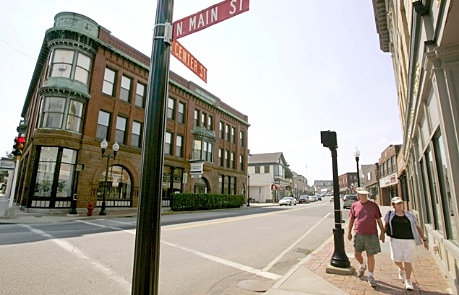If you plan to spend any time in Middleborough, Mass., you might want to be careful if you’re the sort who enjoys slinging four-letter words around. The town’s residents voted 183-50 Monday night to enact a fine for the public use of profanity, so police will have their ears open.
In modern American society, this is typically seen as a conflict between free speech and civility. Some people believe you should be able to say anything you want without government interference, and others believe that offensive and vulgar behavior should be prohibited. Merchants in the town say some of their customers have been uncomfortable with groups of teens hanging out downtown and swearing loudly. So which side is right?
I’m an advocate of keeping government completely out of the business of censoring speech, but I’m also someone who detests profanity. (I’m one of the few people you know who you’ll never hear it from. I didn’t grow up with it and I’ve consciously avoided using it. It’s not what I want to be.) So it sounds as though these two competing values are in conflict and there’s no logical way to resolve it.
That’s sort of true. There’s no logical way to resolve it under the current system of “public” ownership of property and the rules that come with “public” space. But what if the real issue isn’t free speech vs. civility? What if the real issue is who owns property — and who should be allowed to make the rules?
There’s a basic tension between freedom and democracy. Freedom demands that people have the ability to say what they want to say without government censoring it. Democracy demands that the majority of those voting in the town have the right to establish rules for the others to follow. How do we resolve this?
The problem is the existence of “public property.” If everybody owns something, nobody really owns it. In the statist model that we live with today, we’re perpetually faced with that conflict between freedom and democracy. But what if everything were privately owned? Then the question could be settled by the owner — and people would “vote” with their patronage.
What if a downtown area were owned by a commercial company? What if a company developed property and planned shops and attracted merchants to fill up those stores — and then established the rules of behavior for patrons? There would then be no conflict. One shopping area might cater to a more sedate crowd that wants more civility and decorum. Another development might cater to a crowd that’s freewheeling and boisterous. And so forth. Customers would choose the plan that suited them the best. Some models would succeed and some would fail, but they would change as their owners decided that changes could attract customers.
What I’ve just described can’t work in the public system, because the First Amendment prevents governments from making the rules that limit speech. (Whether Middleborough’s rules stand up in court is an open question. It’s hard for me to believe that they will.) On the other hand, it’s a genuine problem for merchants who are trying to conduct business in a pleasant atmosphere and loud, profane people are bothering customers. The current system can’t resolve those conflicts.
We already do a limited version of this with shopping malls. I don’t care for the sterility of most shopping malls, but there are exceptions (and the exceptions tend to be nice places to spend time). We also do a limited version of this at places such as theme parks. You go through a gate and enter private space where someone else sets the rules.
Why can’t we extend this to the rest of society? In fact, why can’t we eliminate all “public” ownership of anything? Why can’t we let entire cities and enclaves of varying sizes operate under their own rules? It’s not possible today, but why can’t it exist in the future?
As long as we live with the coercive state in what it supposed to be a “liberal democracy,” there’s going to be a conflict between freedom and majority will. The privatization of everything — of all of society — is the solution. It’s something that will scare most people. It won’t happen all at once. But I think it’s where we’re going to end up.
In the meantime, I doubt these Middleborough fines will stand up in court. At this point, free speech is still going to trump majority will, but it’s silly that we live under a system that tries to balance these two irreconcilable things.


 After years of wasting my life, sands of time are slipping away
After years of wasting my life, sands of time are slipping away ‘Do you want to sell sugar water … or do you want to change the world?’
‘Do you want to sell sugar water … or do you want to change the world?’ Grow veggies in your own yard? ‘You’re heading to jail, you criminal’
Grow veggies in your own yard? ‘You’re heading to jail, you criminal’